Did you know that there is a lesser-known constellation in ancient Greek and Roman mythology called Ophiuchus? This mysterious and intriguing figure has a rich and fascinating role in mythology, astrology, and symbolism. In this article, we will delve into the captivating stories and meanings behind Ophiuchus in both Greek and Roman mythology. We will explore the role of Ophiuchus as the healer, his encounter with the serpent, and his association with the legendary healer, Asclepius. We will compare Ophiuchus in Greek and Roman mythology and delve into his significance in modern astrology. Join us on this journey through the stars as we uncover the secrets and symbolism surrounding the enigmatic Ophiuchus.
Contents
- Ophiuchus in Greek Mythology
- Ophiuchus in Roman Mythology
- Comparing Ophiuchus in Greek and Roman Mythology
- Ophiuchus in Modern Astrology
- Symbolism and Interpretations
- The Legacy of Ophiuchus
- Conclusion
-
Frequently Asked Questions
- 1. Was Ophiuchus considered one of the twelve zodiac signs in ancient Greek mythology?
- 2. What does Ophiuchus symbolize in Greek mythology?
- 3. Who was Ophiuchus associated with in Greek mythology?
- 4. How did Ophiuchus acquire his healing abilities?
- 5. What is the significance of the serpent in Ophiuchus mythology?
- 6. Did Ophiuchus play a role in any famous Greek myths or legends?
- 7. How does Ophiuchus compare to other mythical healers in Greek mythology?
- 8. What is the Ophiuchus constellation and how can it be seen in the night sky?
- 9. Why is Ophiuchus sometimes considered the thirteenth zodiac sign in modern astrology?
- 10. How does Ophiuchus influence individuals born under its supposed zodiac sign?
- References
-
Frequently Asked Questions
- 1. Why is Ophiuchus not well-known in Greek and Roman mythology?
- 2. Who was Ophiuchus, the healer?
- 3. What is the connection between Ophiuchus and the serpent?
- 4. How does Ophiuchus compare to Asclepius?
- 5. Why is Ophiuchus considered the 13th zodiac sign?
- 6. What does the Ophiuchus constellation represent?
- 7. What are some common interpretations of Ophiuchus in modern astrology?
- 8. How does Ophiuchus symbolize healing and medicine?
- 9. What challenges are associated with Ophiuchus in astrology?
- 10. What is the legacy of Ophiuchus in mythology and astrology?
- References
- Read More
Ophiuchus in Greek Mythology
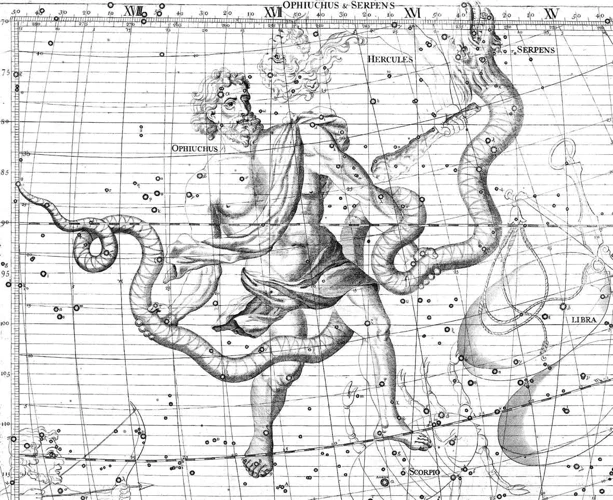
Ophiuchus holds a significant place in Greek mythology, representing various aspects of healing, spirituality, and wisdom. Let’s explore the fascinating stories and legends associated with this enigmatic figure.
Ophiuchus is often depicted as a skilled healer, who possesses great knowledge of medicine and the ability to cure the most challenging ailments. Legend has it that Ophiuchus received his healing abilities from the god Apollo, who taught him the art of medicine. Ophiuchus was known to possess deep insight and understanding of the human body, using his knowledge to heal the sick and wounded.
One of the most famous tales involving Ophiuchus revolves around his encounter with a serpent. As the story goes, Ophiuchus encountered a venomous serpent while walking through a field. Instead of attacking him, the serpent wrapped itself around Ophiuchus’ staff, creating a powerful symbol of healing often associated with the caduceus. This event symbolized Ophiuchus’ ability to tame and control the destructive forces of nature, using them for the benefit of others.
Ophiuchus is closely linked to the legendary ancient Greek healer, Asclepius. In some accounts, Ophiuchus is believed to be Asclepius himself, while in others, he is his guardian or mentor. Asclepius was regarded as the god of medicine and healing, and Ophiuchus played a significant role in his teachings. Ophiuchus passed down his vast knowledge of medicine and healing to Asclepius, who later became renowned for his miraculous healing abilities.
Ophiuchus’ presence in Greek mythology signifies the importance of healing, wisdom, and transformation. His association with the serpent, symbolizing rebirth and transformation, and his connection to the legendary healer Asclepius, emphasize the power of medicine and the pursuit of knowledge in ancient Greek culture. Stay tuned as we uncover more intriguing details about Ophiuchus in Roman mythology and explore the comparisons between the two mythological traditions.
1. Ophiuchus, the Healer
Ophiuchus is widely recognized as a symbol of healing in Greek mythology. His role as a healer is integral to his mythological significance and portrays his deep understanding of medicine and the human body. As the legend goes, Ophiuchus acquired his healing abilities from the god Apollo himself. This divine connection showcases his exceptional knowledge and expertise in the field of medicine.
Known as a skilled practitioner, Ophiuchus was capable of curing even the most challenging ailments. His profound insight into the intricacies of the human body allowed him to bring healing and relief to those suffering from various afflictions. Ophiuchus was considered a bringer of hope and a beacon of light in the realm of medicine.
In ancient Greek society, the art of healing held great importance. The well-being and health of individuals were deeply cherished, and healers like Ophiuchus were highly respected. Their ability to alleviate physical and emotional suffering made them revered figures within the community.
The healing expertise of Ophiuchus encompassed not just physical ailments but also delved into the realm of spiritual healing. His methods reached beyond conventional medicine and tapped into the realms of holistic well-being. Ophiuchus was known to possess a holistic approach, recognizing the interconnectedness of the mind, body, and spirit. This belief system resonated with the ancient Greeks, who understood the significance of maintaining balance and harmony within oneself.
Ophiuchus’ role as a healer is both inspirational and aspirational. It reminds us of the power of knowledge, compassion, and empathy in the pursuit of healing. The legacy of Ophiuchus as a healer continues to inspire modern-day medical professionals and practitioners in their quest to alleviate suffering and promote wellness. The significance of Ophiuchus as a healer can also be observed in modern astrology, where his presence is acknowledged for its potential influence on individuals born under his sign. Stay tuned as we uncover more captivating stories and aspects of Ophiuchus in Greek and Roman mythology.
2. Ophiuchus and the Serpent
In Greek mythology, the encounter between Ophiuchus and the serpent is a significant event that holds deep symbolism. According to the legend, Ophiuchus found himself face-to-face with a venomous serpent while walking through a field. Instead of attacking him, the serpent, captivated by Ophiuchus’ gentle and healing nature, wrapped itself around his staff.
This encounter has become a symbol of Ophiuchus’ power to control and tame the destructive forces of nature. The serpent, with its venomous nature, represents the challenges and adversities that life presents. By peacefully coexisting with the serpent, Ophiuchus showcases his ability to harness and utilize these challenges for the greater good.
The image of the serpent wrapped around Ophiuchus’ staff became a powerful symbol, often associated with the medical field. This symbol, known as the caduceus, is widely recognized as a representation of healing and medicine. It is important to note that the caduceus, while widely used in modern medical imagery, actually represents the Greek god Hermes, known for his association with commerce, communication, and travel. However, in the context of Ophiuchus, it gained a second interpretation as a symbol of healing.
The encounter between Ophiuchus and the serpent highlights the transformative nature of healing and the ability to embrace and overcome challenges. It symbolizes the power of humanity to harness the forces of nature, both positive and negative, for the betterment of society. As we explore the significance of Ophiuchus in both Greek and Roman mythology, we’ll delve deeper into his connection to healing and the legendary healer, Asclepius.
(Reference: scientific knowledge of ancient astronomers)
3. Ophiuchus and Asclepius
Ophiuchus and Asclepius share a deep connection in Greek mythology, one that highlights the significance of healing and medicine. Asclepius, the legendary Greek god of medicine and healing, is often associated with Ophiuchus.
According to ancient Greek tales, Asclepius was often depicted as a skilled healer who possessed the ability to bring the dead back to life. It is believed that he learned the art of medicine from none other than Ophiuchus himself. Ophiuchus, sometimes referred to as the father or mentor of Asclepius, passed down his extensive knowledge of medicine and healing to the young healer.
In the stories surrounding Ophiuchus and Asclepius, their healing abilities were so remarkable that they caught the attention of the gods. This led to a complex series of events, including Asclepius resurrecting the dead, which ultimately resulted in his own demise at the hands of Zeus. As a punishment for showing mortal beings the secrets of immortality, Zeus struck Asclepius with a thunderbolt.
However, even in death, Asclepius continued to play a significant role in Greek mythology. He was honored as a god and had many temples dedicated to him throughout ancient Greece. The snake, which is closely associated with healing and medicine, became a symbol of Asclepius. This symbol, known as the Rod of Asclepius, features a serpent wrapped around a rod and is still widely recognized as a symbol of healing today.
The relationship between Ophiuchus and Asclepius underscores the importance of healing and the pursuit of medical knowledge in Greek mythology. Their stories serve as a testament to the power of healing and the reverence placed upon those who could bring relief to the suffering. As we explore Ophiuchus in Roman mythology and compare the two mythological traditions, we will continue to uncover more captivating details surrounding this intriguing figure.
Ophiuchus in Roman Mythology
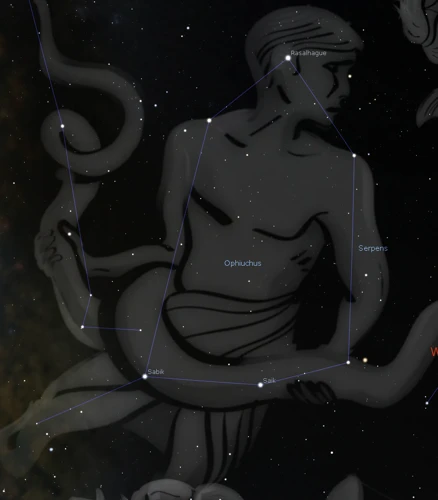
Ophiuchus also holds a significant place in Roman mythology, although with some variations from the Greek tradition. Let’s explore the intriguing role of Ophiuchus in Roman mythology.
In Roman mythology, Ophiuchus is often interpreted as a celestial figure associated with healing and wisdom. Unlike in Greek mythology, where Ophiuchus is closely linked to the legendary healer Asclepius, the Roman interpretation of Ophiuchus is not directly tied to a specific character or deity. Instead, Ophiuchus is seen as a representation of the healing arts and the transformative power of medicine.
The interpretation of Ophiuchus in Roman mythology is believed to be influenced by the Egyptian deity Imhotep, who was revered as a wise physician and architect. Imhotep’s reputation as a healer and his association with serpents were likely blended with the Greek figure of Ophiuchus, leading to the Roman understanding of this constellation. This fusion of different mythological elements highlights the syncretic nature of Roman mythology, incorporating various beliefs and deities from different cultures.
Roman astrologers also considered the impact of Ophiuchus in their astrological practices. While the traditional zodiac consists of twelve signs, some Roman astrologers acknowledged Ophiuchus as a thirteenth zodiac sign, positioned between Scorpio and Sagittarius. This belief in the existence of Ophiuchus as a zodiac sign has gained attention in modern times, sparking discussions and debates among astrologers and enthusiasts.
The exact details and stories surrounding Ophiuchus in Roman mythology may vary, but his symbolic association with healing and wisdom remains consistent. The merging of Egyptian and Greek influences, along with the potential inclusion of Ophiuchus as a zodiac sign, adds an intriguing layer to the mythology and astrological significance of Ophiuchus in Roman culture. As we continue our exploration, we will delve deeper into the comparisons between Ophiuchus in Greek and Roman mythology.
1. Ophiuchus, the Interpreted Version
In Roman mythology, Ophiuchus also has an interpreted version that holds its own significance and symbolism. In this version, Ophiuchus is often associated with the mythical figure of Aesculapius or Asclepius, the god of healing and medicine. Aesculapius was believed to be the son of Apollo and Coronis, a mortal woman. Like Ophiuchus in Greek mythology, Aesculapius possessed incredible healing abilities and was revered as a powerful deity in ancient Rome.
The story of Aesculapius in Roman mythology follows a similar narrative to that of Ophiuchus in Greek mythology. Aesculapius was said to have been taught the art of medicine by Apollo and became well-known for his ability to heal the sick and even bring the dead back to life. This divine power made him highly revered and sought after by many.
However, the Roman interpretation of Ophiuchus and Aesculapius introduces additional elements. Aesculapius is often depicted with a staff entwined by a snake, known as the Rod of Aesculapius, which has since become a symbol of healing in modern medicine. The snake intertwining around the staff is believed to have been the same serpent that Ophiuchus encountered in Greek mythology.
It is interesting to note the parallels and similarities between the Greek and Roman interpretations of Ophiuchus and Aesculapius. Both figures embody the healing arts, drawing upon the serpent symbolism to represent the power of transformation and rebirth. These mythological tales and their subsequent interpretations showcase the importance placed on medicine and healing in ancient Greek and Roman cultures.
As we continue our exploration of Ophiuchus and its significance, we will further delve into the comparisons between the Greek and Roman versions, uncovering the nuances and shared symbolism between these two mythological traditions. Stay tuned as we unravel the mystique of Ophiuchus and its enduring legacy in astrology and mythology.
2. Ophiuchus and Aesculapius
In Greek mythology, the connection between Ophiuchus and Aesculapius, the god of medicine and healing, is significant. Aesculapius, often referred to as Asclepius in Greek mythology, is closely associated with Ophiuchus and his teachings. According to the myth, Aesculapius was the son of Apollo and a human mother named Coronis. Raised by the centaur Chiron, Aesculapius inherited his father’s skill in healing and became a renowned healer himself.
Ophiuchus, with his immense knowledge and wisdom, played a critical role in shaping Aesculapius’ understanding of medicine and healing. It is said that Ophiuchus mentored Aesculapius, passing down his healing techniques and secrets. Under Ophiuchus’ guidance, Aesculapius became a legendary figure known for his ability to heal the sick and even bring the dead back to life. This extraordinary power caught the attention of the gods, leading to both admiration and jealousy.
Despite his contributions to humanity, Aesculapius’ ability to raise the dead disturbed the balance of life and death in the eyes of Zeus, the king of the gods. Zeus, fearing the implications of immortality, struck Aesculapius with a thunderbolt, ending his life. However, in honor of his extraordinary healing skills, Zeus placed Aesculapius among the stars as the constellation Ophiuchus.
The connection between Ophiuchus and Aesculapius reinforces the importance of healing and medicine in Greek mythology. Both figures represent the pursuit of knowledge, the power to heal, and the delicate balance between life and death. The stories surrounding Ophiuchus and Aesculapius highlight the significance of these mythological figures in ancient Greek culture, immortalizing their legacies in the celestial realm.
Continue reading as we delve into the comparisons between Ophiuchus in Greek and Roman mythology, shedding light on the different interpretations of this intriguing constellation.
Comparing Ophiuchus in Greek and Roman Mythology
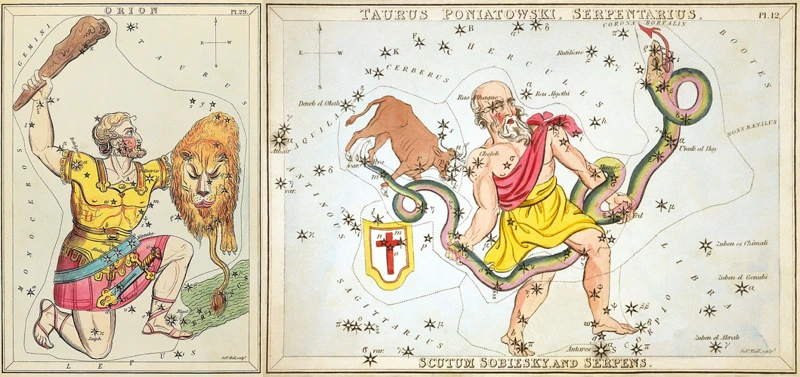
In comparing Ophiuchus in Greek and Roman mythology, we discover intriguing similarities and differences between the two traditions. In Greek mythology, Ophiuchus is often depicted as a skilled healer and teacher, while in Roman mythology, his interpretation takes on a different form.
In Greek mythology, Ophiuchus is associated with the renowned healer Asclepius, who is considered a demigod. Ophiuchus plays a significant role as Asclepius’ mentor or guardian, imparting his vast knowledge of medicine and healing. Asclepius, in turn, becomes a legendary figure revered for his healing abilities and temples dedicated to him.
On the other hand, in Roman mythology, Ophiuchus assumes a slightly different interpretation. Ophiuchus is often identified with the figure of Aesculapius, the Roman equivalent of Asclepius. Both Aesculapius and Asclepius share similar healing attributes and are represented with serpents wrapped around their staff, symbolizing their ability to cure the sick.
Despite the differences in names and slight variations in their stories, both Ophiuchus and his counterparts in Greek and Roman mythology represent the importance of healing and medicine in their respective cultures. The similarities in their attributes and associations highlight the enduring significance of these themes across ancient civilizations.
While exploring Ophiuchus in Greek and Roman mythology, we also encounter the influence of astrology. Ophiuchus is not typically recognized as one of the twelve zodiac signs in mainstream Western astrology. However, in recent years, there has been some discussion about Ophiuchus as the potential thirteenth zodiac sign. This debate has sparked interest and curiosity among astrology enthusiasts, drawing connections between ancient mythology and modern interpretations.
Join us as we delve deeper into the role of Ophiuchus in modern astrology and explore the symbolism and interpretations associated with this intriguing constellation. Discover how Ophiuchus relates to the constellation and astrological aspects of our lives, including the significance of sextiles and the exploration of comets.
Ophiuchus in Modern Astrology
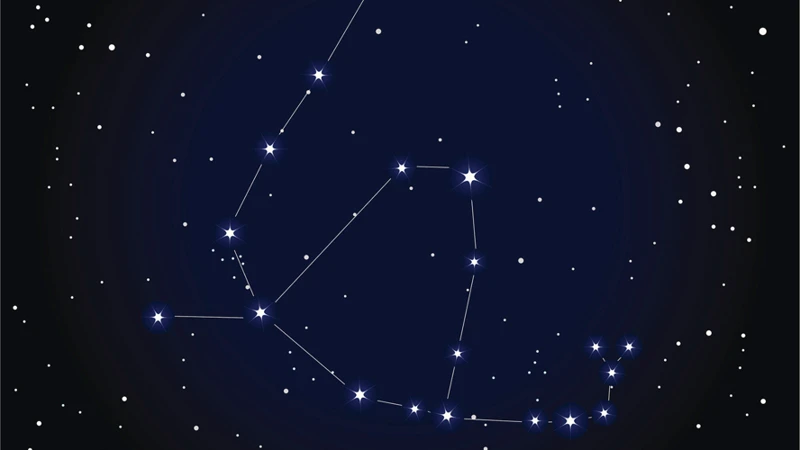
In modern astrology, Ophiuchus plays a unique and controversial role. While the traditional zodiac consists of twelve constellations, Ophiuchus has gained attention as a potential thirteenth zodiac sign. This idea stems from the fact that the sun passes through the constellation of Ophiuchus for a short period each year, following Scorpio and preceding Sagittarius.
Some astrologers argue that individuals born between November 29 and December 17 should be assigned the sign of Ophiuchus instead of Sagittarius, shifting the entire zodiac calendar. This concept has sparked debates and discussions among astrologers and enthusiasts around the world.
Supporters of incorporating Ophiuchus as a zodiac sign believe that it brings new qualities and characteristics to astrology. They attribute transformative and healing powers to Ophiuchus individuals, seeing them as natural healers and seekers of truth. Ophiuchus is also associated with wisdom, intuition, and an inclination towards spiritual exploration.
However, it is important to note that this shift in the zodiac is not universally accepted. Many traditional astrologers argue that the zodiac should remain unchanged and that Ophiuchus is not a recognized sign. The controversy surrounding Ophiuchus in modern astrology continues to intrigue and pique the curiosity of astrologers and astrology enthusiasts alike.
While Ophiuchus may not be officially recognized as a zodiac sign by traditional astrology, its exploration and inclusion in discussions have opened up new avenues for understanding astrological influences. Whether Ophiuchus becomes an established part of the zodiac or remains a point of debate, its presence in modern astrology adds another layer of complexity and intrigue to the astrological landscape.
1. The Ophiuchus Constellation
The Ophiuchus constellation, also known as the Serpent Bearer, is a prominent feature in modern astrology and has captured the fascination of astronomers and stargazers alike. Here are some intriguing facts about the Ophiuchus constellation:
1. Location and Visibility: The Ophiuchus constellation can be found near the celestial equator, straddling the Milky Way. It is located between the constellations of Scorpius and Hercules, making it visible in the northern and southern hemispheres during certain times of the year.
2. Star Brightness: The constellation is home to several notable stars, including Rasalhague (Alpha Ophiuchi), which is the brightest star in the constellation. Other stars such as Sabik, Cebalrai, and Han are also prominent features within Ophiuchus.
3. The Serpent: One of the most recognizable features of the Ophiuchus constellation is the inclusion of the snake symbol. The constellation’s name, Ophiuchus, comes from the Greek word for “serpent bearer,” representing the figure from mythology who is often depicted holding a snake.
4. Zodiac Controversy: While traditionally there are twelve zodiac signs, the Ophiuchus constellation is often referred to as the 13th zodiac sign. This controversy arose due to the alignment of the constellations with the astrological signs, with Ophiuchus falling between Scorpio and Sagittarius. However, it’s essential to note that this inclusion is not widely recognized in traditional astrology practices.
5. Astrological Interpretations: In modern astrology, those born between November 29th and December 17th are said to be born under the sign of Ophiuchus. Individuals associated with this sign are often described as seekers of knowledge, wisdom, and considered to possess healing qualities.
The Ophiuchus constellation has captivated celestial enthusiasts due to its unique position, its connection to ancient Greek mythology, and its potential influence in astrology. While its role in astrology may be debated, the symbolism and allure of this constellation continue to intrigue astronomers and astrologers alike. Stay tuned as we explore the symbolism and interpretations surrounding Ophiuchus, uncovering its deeper meanings in the realm of astrology.
2. Ophiuchus as the 13th Zodiac Sign
Ophiuchus has gained attention and sparked debates in modern astrology as a potential 13th zodiac sign. While the traditional zodiac consists of twelve signs, Ophiuchus is believed by some to be an additional sign that influences astrological interpretations. This notion stems from the alignment of the Sun with Ophiuchus during a specific time of the year, typically from November 29 to December 18.
Proponents of Ophiuchus argue that it brings new characteristics and energies to the astrological landscape. They describe individuals born under this sign as natural healers and seekers of knowledge, combining the traits of both Scorpio and Sagittarius. Ophiuchus is thought to possess traits such as ambition, intuition, wisdom, and a deep connection to spiritual matters. These qualities contribute to the unique and complex nature of those born under this sign.
However, it’s important to note that Ophiuchus is not universally recognized as a zodiac sign in mainstream astrology. Traditional astrologers stick to the twelve sign system that has been in use for centuries. The inclusion of Ophiuchus as a zodiac sign would require a significant restructuring of the astrological calendar and interpretations.
The debate surrounding Ophiuchus as a zodiac sign highlights the evolving nature of astrology and the exploration of various astrological aspects. Astrologers continue to study and interpret celestial phenomena, such as the significance of sextiles in astrological aspects or the exploration of comets, in order to deepen their understanding of the cosmic influences on individuals and events.
Whether Ophiuchus becomes an officially recognized zodiac sign or remains a subject of fascination and discussion within astrology, it underscores the ongoing exploration and reinterpretation of astrological practices. As astrology evolves and adapts to new perspectives and findings, Ophiuchus serves as a reminder of the diversity and potential expansion of the zodiac system.
Symbolism and Interpretations
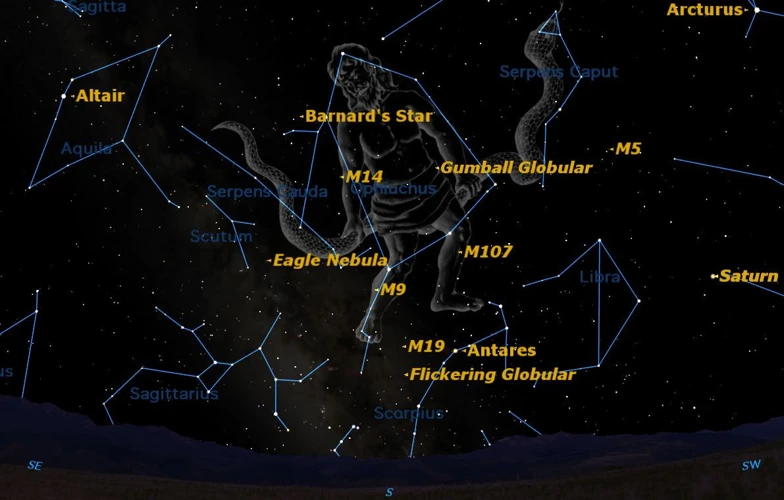
Symbolism and interpretations surrounding Ophiuchus are diverse and hold significant meaning in various contexts. Let’s delve into the symbolism and explore the different ways Ophiuchus is interpreted and understood.
1. Healing and Medicine: Ophiuchus is primarily associated with healing and medicine in both Greek and Roman mythology. His role as a skilled healer highlights the importance of physical, emotional, and spiritual well-being. Ophiuchus represents the pursuit of knowledge and the power of medicine to alleviate suffering and restore balance.
2. Transformation and Rebirth: The encounter between Ophiuchus and the serpent symbolizes transformation and rebirth. The serpent wrapped around Ophiuchus’ staff signifies the shedding of old and harmful patterns, leading to personal growth and renewal. This symbolism aligns with the serpent’s connection to rebirth and the cycle of life.
3. Challenges and Astrological Influences: Ophiuchus is often associated with facing challenges and overcoming adversity. Just as Ophiuchus tamed the serpent, individuals born under the sign or influenced by its energy are believed to possess strength, resilience, and the ability to navigate difficult situations. Astrologically, Ophiuchus represents a balance between the opposing forces of creation and destruction, requiring individuals to find harmony and equilibrium in their lives.
The interpretations of Ophiuchus’s symbolism vary across different cultures and belief systems. In modern astrology, Ophiuchus has gained attention as a potential thirteenth zodiac sign, challenging traditional astrological structures. However, it’s important to note that the inclusion of Ophiuchus as a zodiac sign is not universally accepted or recognized.
Understanding the symbolism and interpretations associated with Ophiuchus allows us to appreciate the multifaceted nature of this mythical figure. From healing and transformation to overcoming challenges, Ophiuchus’s significance resonates with individuals seeking balance, growth, and the pursuit of knowledge. As we further explore the legacy of Ophiuchus, we’ll uncover more intriguing aspects of this enigmatic constellation and its cultural impact.
1. Healing and Medicine
Healing and medicine are central themes when exploring the role of Ophiuchus in Greek mythology. Ophiuchus is often revered as a symbol of healing and is associated with the profound knowledge and practices of medicine. In ancient Greek culture, the pursuit of healing and the restoration of health were highly valued.
Ophiuchus is believed to possess exceptional healing abilities, having been taught the art of medicine by the god Apollo himself. This divine wisdom granted Ophiuchus the power to heal even the most challenging afflictions. His understanding of the human body and herbal remedies made him a revered figure in the field of medicine.
Ophiuchus’s association with healing goes beyond his personal abilities. He is also closely linked to the legendary Greek god of medicine, Asclepius. Asclepius, who learned from Ophiuchus, is praised for his incredible healing miracles and the establishment of healing sanctuaries known as Asclepions. These sanctuaries acted as centers for the sick and offered various therapies, including dream interpretation and medicinal baths, to promote healing.
The symbolism of Ophiuchus as a healer extends beyond physical healing. It also encompasses emotional and spiritual healing. Ophiuchus embodies the profound wisdom and understanding required to heal not only the body but also the mind and soul.
In astrology, Ophiuchus is associated with the constellation and the sign associated with it. This celestial entity is believed to possess certain astrological influences related to healing, transformation, and spiritual growth. The sun’s position in Ophiuchus during one’s birth is said to indicate a person’s potential for healing or their affinity with medicine and wellness.
The significance of Ophiuchus in healing and medicine highlights the ancient Greeks’ reverence for the art of healing and the importance of holistic well-being. Ophiuchus serves as a reminder of the enduring value of health and the eternal quest for healing, which remains relevant to this day. Explore more about the astrological aspects and the impact of celestial phenomena like comets on ancient wisdom in our article “The Significance of Sextiles in Astrological Aspects” or “The Exploration of Comets“.
2. Transformation and Rebirth
Transformation and rebirth are key themes often associated with Ophiuchus in mythology. Let’s delve deeper into the significance of these concepts within the context of Ophiuchus’ mythology.
In Greek mythology, Ophiuchus is closely linked to the serpent, which symbolizes transformation and rebirth. The encounter between Ophiuchus and the serpent, where the serpent wraps itself around Ophiuchus’ staff, represents the power to control and channel the forces of nature for healing purposes. This event is seen as a metaphor for the transformative journey of healing, where one must confront and overcome challenges in order to bring about a rebirth or renewal.
The serpent is also widely associated with shedding its skin, a process that symbolizes the concept of renewal and transformation. This shedding of skin is seen as a metaphor for personal growth and the ability to let go of past limitations or experiences. Ophiuchus’ connection to the serpent further reinforces the idea of transformation and the potential for spiritual and personal growth.
The association of Ophiuchus with the healer Asclepius adds another layer of symbolism related to transformation and rebirth. Asclepius, believed to be a mortal who obtained divine knowledge from Ophiuchus, was renowned for his ability to bring the dead back to life. This ability to revive the dead is seen as a potent metaphorical representation of rebirth and transformation.
The mythology of Ophiuchus highlights the themes of transformation and rebirth, emphasizing the potential for personal growth and renewal. The symbolism of the serpent, shedding of skin, and the ability to bring the dead back to life all contribute to the rich tapestry of Ophiuchus’ role in Greek mythology. In the next section, we will explore the challenges and astrological influences associated with Ophiuchus. Stay tuned as we uncover more intriguing details about the symbolism and interpretations surrounding this fascinating figure.
3. Challenges and Astrological Influences
When it comes to Ophiuchus and astrology, there are certain challenges and astrological influences associated with this constellation. The unique position of Ophiuchus as the 13th zodiac sign raises questions and challenges the traditional understanding of astrology.
Firstly, Ophiuchus challenges the conventional division of the zodiac into twelve signs, each representing different personality traits and characteristics. With the inclusion of Ophiuchus as a zodiac sign, individuals born under this sign may feel a sense of being outside the norm or not fitting into the traditional astrological framework. They may struggle with finding accurate horoscopes or personalized readings that encompass their unique qualities and experiences.
Additionally, astrologers and enthusiasts have been intrigued by the astrological influences of Ophiuchus. Individuals born under the sign of Ophiuchus are believed to possess distinctive traits and characteristics. They are often seen as healers, visionaries, and seekers of knowledge, drawing upon the wisdom and transformative energy associated with the constellation.
The challenges associated with Ophiuchus in astrology also extend to the interpretation of its placement and aspects within a birth chart. Astrologers may grapple with determining the exact influence of Ophiuchus and how it interplays with the other zodiac signs and celestial bodies. The limited historical documentation and varying interpretations of this constellation further add to the complexity and debate surrounding its astrological significance.
Despite the challenges and uncertainties, Ophiuchus in astrology offers a fresh perspective and an opportunity for exploration and self-discovery. It encourages individuals to embrace their unique qualities and look beyond the traditional zodiac framework for a deeper understanding of themselves and their place in the universe.
The enigmatic nature of Ophiuchus and its astrological influences continue to captivate astrologers and enthusiasts alike. Its inclusion in modern astrology is a testament to the ever-evolving nature of this ancient practice, as it seeks to accommodate new discoveries and interpretations. In the next section, we will uncover the rich symbolism and interpretations associated with Ophiuchus, shedding light on its deeper meanings and significance.
The Legacy of Ophiuchus
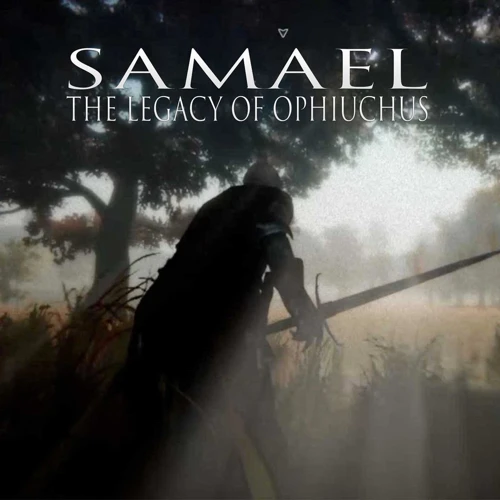
The legacy of Ophiuchus can be seen in various aspects of ancient and modern culture. Despite being a lesser-known constellation, Ophiuchus has left a lasting impact on different fields and beliefs.
In terms of astronomy, Ophiuchus has contributed to our scientific knowledge and exploration of the cosmos. Ancient astronomers recognized Ophiuchus as a significant constellation in the night sky, paving the way for future discoveries and observations. Even today, astronomers continue to study Ophiuchus and its neighboring constellations, deepening our understanding of the universe.
In astrology, Ophiuchus has sparked debates and discussions. Some astrologers argue that Ophiuchus should be recognized as the thirteenth zodiac sign, challenging the traditional twelve-sign system. This perspective suggests that those born between November 29 and December 17 fall under the influence of Ophiuchus. However, this viewpoint is not universally accepted, and the traditional zodiac system remains dominant.
The symbolism associated with Ophiuchus has found its place in art, literature, and spirituality. Ophiuchus represents healing, transformation, and wisdom – characteristics that continue to captivate and inspire artists and writers. The intertwining serpents, staff, and symbolic imagery associated with Ophiuchus can be found in various forms of artistic expression, conveying messages of personal growth, renewal, and spiritual awakening.
Ophiuchus serves as a reminder of the ancient civilizations’ reverence for nature and their pursuit of knowledge. As we unravel the mythological stories and symbolism surrounding Ophiuchus, we gain insights into the worldview and values of the ancient Greeks and Romans. The legacy of Ophiuchus reminds us of the significant role astronomy, mythology, and spirituality played in shaping their cultures.
The legacy of Ophiuchus is felt across multiple domains, from astronomy and astrology to art and spirituality. This constellation and its associated symbolism continue to intrigue and inspire individuals to explore the mysteries of the universe while reflecting on the profound wisdom and healing power found in ancient Greek and Roman mythology.
Conclusion

In conclusion, Ophiuchus holds a significant and captivating role in both Greek and Roman mythology. In Greek mythology, Ophiuchus is revered as the skilled healer and mentor to the legendary healer, Asclepius. His encounter with the serpent and his ability to tame its destructive forces symbolize his power over nature and his commitment to using it for healing purposes.
In Roman mythology, Ophiuchus is interpreted as an alternative or counterpart to the god Aesculapius, further emphasizing his healing abilities and association with medicine. The symbolism and interpretations surrounding Ophiuchus go beyond his role as a healer and extend to themes of transformation, rebirth, and the challenges that astrological influences may pose.
Today, Ophiuchus continues to intrigue and fascinate astrologers and enthusiasts alike. Some claim that Ophiuchus should be recognized as the thirteenth zodiac sign, reflecting its astrological significance beyond traditional systems. Whether or not Ophiuchus becomes an official part of the zodiac, its symbolism and stories will continue to be explored and interpreted.
The legacy of Ophiuchus spans centuries, leaving a lasting impact on art, literature, and astrology. Its symbolism of healing and wisdom resonates with many, reminding us of the importance of knowledge and compassion in our lives. As we gaze at the stars and contemplate the mysteries of the cosmos, let us always remember the enigmatic figure of Ophiuchus and the deeper meanings it imparts.
Thank you for joining us on this journey through the realms of Greek and Roman mythology. May the wisdom and healing associated with Ophiuchus inspire you as you navigate the stars and seek greater understanding of the world around us.
Frequently Asked Questions

1. Was Ophiuchus considered one of the twelve zodiac signs in ancient Greek mythology?
No, in ancient Greek mythology, Ophiuchus was not included as one of the traditional twelve zodiac signs. Instead, it was recognized as a separate constellation with its own significance.
2. What does Ophiuchus symbolize in Greek mythology?
Ophiuchus symbolizes the healing arts, medicine, and wisdom. It represents the power to tame and utilize the forces of nature for the betterment of humanity.
3. Who was Ophiuchus associated with in Greek mythology?
Ophiuchus was closely associated with Asclepius, the god of medicine and healing. Ophiuchus either served as Asclepius’ guardian, mentor, or was believed to be a form of Asclepius himself.
4. How did Ophiuchus acquire his healing abilities?
Ophiuchus acquired his healing abilities from the god Apollo, who taught him the art of medicine. His deep understanding of the human body allowed him to treat and cure various ailments.
5. What is the significance of the serpent in Ophiuchus mythology?
The serpent is a powerful symbol in Ophiuchus mythology, representing transformation, rebirth, and healing. It is often associated with the caduceus, which is a symbol of medicine and healing.
6. Did Ophiuchus play a role in any famous Greek myths or legends?
While Ophiuchus does not have any standalone myths dedicated solely to him, he played a significant role in the stories and legends surrounding Asclepius, the famous Greek healer.
7. How does Ophiuchus compare to other mythical healers in Greek mythology?
Ophiuchus is often regarded as one of the most skilled healers in Greek mythology, alongside Asclepius. His wisdom and expertise in medicine make him a revered figure in the healing arts.
8. What is the Ophiuchus constellation and how can it be seen in the night sky?
The Ophiuchus constellation is located near the celestial equator, between the constellations of Scorpius and Hercules. It can be observed in the northern hemisphere during the summer months.
9. Why is Ophiuchus sometimes considered the thirteenth zodiac sign in modern astrology?
In modern astrology, some believe that the inclusion of Ophiuchus as the thirteenth zodiac sign would align it with the dates between November 29 and December 17. This perspective challenges the traditional twelve sign system.
10. How does Ophiuchus influence individuals born under its supposed zodiac sign?
For those who consider Ophiuchus as a zodiac sign, individuals born under this sign are believed to possess healing and intuitive abilities. They are seen as wise, empathetic, and have a strong inclination towards the medical or spiritual fields.
References
Frequently Asked Questions

1. Why is Ophiuchus not well-known in Greek and Roman mythology?
Ophiuchus is not as well-known in Greek and Roman mythology because its significance was overshadowed by other popular myths and gods. However, it still played a significant role in certain aspects of ancient mythology.
2. Who was Ophiuchus, the healer?
Ophiuchus, also known as Asclepius, was a skilled healer in Greek mythology. He was known for his ability to cure diseases and even bring the dead back to life.
3. What is the connection between Ophiuchus and the serpent?
Ophiuchus is often depicted holding a serpent, which represents the transformative power of healing. The serpent is a symbol of rebirth and regeneration, which aligns with Ophiuchus’ role as a healer.
4. How does Ophiuchus compare to Asclepius?
Ophiuchus and Asclepius are often portrayed as the same character in Greek mythology. However, in some stories, Ophiuchus is considered to be the father or mentor of Asclepius, emphasizing his role as a teacher and guide.
5. Why is Ophiuchus considered the 13th zodiac sign?
Ophiuchus is considered the 13th zodiac sign by some astrologers who believe in incorporating it into the traditional 12-sign zodiac system. Its inclusion is based on the position of the Sun during certain periods of the year.
6. What does the Ophiuchus constellation represent?
The Ophiuchus constellation represents the mythological figure of Ophiuchus. It is associated with healing, medicine, and the transformative power of rebirth.
7. What are some common interpretations of Ophiuchus in modern astrology?
In modern astrology, Ophiuchus is often associated with traits such as wisdom, intuition, and a deep connection to the spiritual realms. It is also believed to symbolize the union of science and spirituality.
8. How does Ophiuchus symbolize healing and medicine?
Ophiuchus symbolizes healing and medicine through its association with Asclepius. The serpent held by Ophiuchus represents the staff of Asclepius, which has become a universal symbol for medicine and healing.
9. What challenges are associated with Ophiuchus in astrology?
Ophiuchus is believed to bring a challenging energy to astrology charts. People born under Ophiuchus may face obstacles related to power struggles, secrets, and a constant need for personal transformation.
10. What is the legacy of Ophiuchus in mythology and astrology?
The legacy of Ophiuchus includes its association with healing and medicine, as well as its representation of the balance between science and spirituality. Its presence in astrology has sparked debates and discussions about the validity and inclusivity of zodiac systems.







